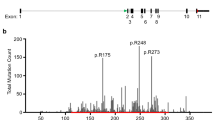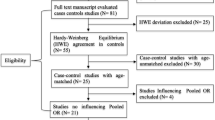Abstract
Hispanic women differ from non-Hispanics in breast cancer incidence, stage at diagnosis, and survival. Ethnic differences in genetic makeup, reproductive patterns, diet, socioeconomic status, physical activity, and other unidentified cultural factors may be responsible for the disparity. This study investigated occurrences of p53 tumor suppressor gene mutations in South Florida white Hispanic and white non-Hispanic women with primary breast cancer. Tumor tissues were obtained from a consecutive series of women with breast cancer who underwent breast resection at the Jackson Memorial Hospital, Miami, Florida between 1984 and 1986. A total of 231 women with primary breast cancer, aged 31–85 years, were included in the study. Among them, 64 (27.7%) were white Hispanic and 167 (72.3%) were white non-Hispanic. The majority of the patients were white non-Hispanics (72.3%). Compared to white non-Hispanics, however, white Hispanics had significantly higher proportions of tumors larger than 2 cm (53.1% v.s. 28.7%, p = 0.00) as well as larger tumor size at diagnosis (mean: 4.2 v.s. 3.0 cm, p = 0.00). The p53 gene mutation rate was significantly lower in white Hispanics than in white non-Hispanics (51.6% v.s. 70.7%, p = 0.01). Furthermore, among node-negative breast cancer patients, after adjustment for tumor size at diagnosis, logistic regression results showed that white Hispanics were 71% less likely than white non-Hispanics to carry p53 mutations (OR = 0.29 and 95% CI = 0.09–0.91). We conclude that white Hispanic women with breast cancer might have lower p53 gene mutation prevalence than white non-Hispanic women.
Similar content being viewed by others
References
Zambrana RE, Carter-Pokras O: Health data issues for Hispanics: implications for public health research. J Health Care Poor U 12: 20–34, 2001
Trapido EJ, Chen F, Davis K, Lewis N, MacKinnon JA, Strait PM: Cancer in south Florida Hispanic women. A 9-year assessment. Arch Intern Med 154: 1083–1088, 1994
Shai D, Rosenwaike I: Mortality among Hispanics in metropolitan Chicago: an examination based on vital statistics data. J Chronic Dis 40: 445–451, 1987
Sorlie PD, Backlund E, Johnson NJ, Rogot E: Mortality by Hispanic status in the United States. JAMA 270: 2464–2468, 1993
Eidson M, Becker TM, Wiggins CL, Key CR, Samet JM: Breast cancer among Hispanics, American Indians and non-Hispanic whites in New Mexico. Int J Epidemiol 23: 231–237, 1994
Howe HL, Wingo PA, Thun MJ, Ries LA, Rosenberg HM, Feigal EG, Edwards BK: Annual report to the nation on the status of cancer (1973 through 1998), featuring cancers with recent increasing trends. J Natl Cancer Inst 93: 824–842, 2001
Trapido EJ, Burciaga VR, Obeso JL, Strickman-Stein N, Rotger A, Perez-Stable EJ: Epidemiology of cancer among Hispanics in the United States. J Natl Cancer Inst Monogr 17–28, 1995
Miller B, Kolonel L, Bernstein L: Racial/Ethnic Patterns of Cancer in the United States 1988-1992. National Cancer Institute, Bethesda, MD, 1996
Elledge RM, Clark GM, Chamness GC, Osborne CK: Tumor biologic factors and breast cancer prognosis among white, Hispanic, and black women in the United States. J Natl Cancer Inst 86: 705–712, 1994
Gilliland FD, Li YF, Baumgartner K, Crumley D, Samet JM: Physical activity and breast cancer risk in Hispanic and non-Hispanic white women. Am J Epidemiol 154: 442–450, 2001
Weston A, Godbold JH: Polymorphisms of H-ras and p53 in breast cancer and lung cancer: a meta-analysis. Environ. Health Perspect 105: 919–926, 1997
Sjalander A, Birgander R, Hallmans G, Cajander S, Lenner P, Athlin L, Beckman G, Beckman L: p53 polymorphisms and haplotypes in breast cancera. Carcinogenesis (London) 17: 1313–1316, 1996
Weston A, Pan C, Ksieski HB, Wallenstein S, Berkowitz GS, Tartter PI, Bleiweiss IJ, Brower ST, Senie RT, Wolff MS: p53 haplotype determination in breast cancer. Cancer Epidemiola Biomark Prev 6: 105–112, 1997
Weston A, WolffMS, Morabia A: True extended haplotypes of p53: indicators of breast cancer risk. Cancer Genet Cytogenet 102: 153–154, 1998
Wang-Gohrke S, Rebbeck TR, Besenfelder W, Kreienberg R, Runnebaum IB: p53 germline polymorphisms are associated with an increased risk for breast cancer in German women. Anticancer Res 18: 2095–2099, 1998
Levine AJ, Reich N, Thomas R: The regulation of a cellular protein, p53, in normal and transformed cells. Prog Clin Biol Res 119: 159–169, 1983
Hansen R, Oren M: p53, from inductive signal to cellular effect. Curr Opin Genet Dev 7: 46–51, 1997
Prives C, Hall PA: The p53 pathway. J Pathol 187: 112–126, 1999
Elledge RM, Allred DC: Prognostic and predictive value of p53 and p21 in breast cancer. Breast Cancer Res Treat 52: 79–98, 1998
Nadji M, Meng L, Lin L, Nassiri M, Morales AR: Detection of p53 gene abnormality by sequence analysis of archival paraffin tissue. A comparison with fresh-frozen specimens. Diagn Mol Pathol 5: 279–283, 1996
SAS Institute. SAS User's Guide: Statistics v6. SAS Institute, Inc., Cary, NC, 1996
Levine AJ, Chang A, Dittmer D, Notterman DA, Silver A, Thorn K, Welsh D, Wu M: The p53 tumor suppressor gene. J Lab Clin Med 123: 817–823, 1994
Harris CC, Hollstein M: Clinical implications of the p53 tumor-suppressor gene. N Engl J Med 329: 1318–1327, 1993
Greenblatt MS, Bennett WP, Hollstein M, Harris CC: Mutations in the p53 tumor suppressor gene: clues to cancer etiology and molecular pathogenesis. Cancer Res 54: 4855–4878, 1994
Kucera E, Speiser P, Gnant M, Szabo L, Samonigg H, Hausmaninger H, Mittlbock M, Fridrik M, Seifert M, Kubista E, Reiner A, Zeillinger R, Jakesz R: Prognostic significance of mutations in the p53 gene, particularly in the zinc-binding domains, in lymph node-and steroid receptor positive breast cancer patients. Austrian Breast Cancer Study Group. Eur J Cancer 35: 398–405, 1999
Tsuda H, Hirohashi S: Association among p53 gene mutation, nuclear accumulation of the p53 protein and aggressive phenotypes in breast cancer. Int J Cancer 57: 498–503, 1994
Elledge RM: Assessing p53 status in breast cancer prognosis: where should you put the thermometer if you think your p53 is sick? J Natl Cancer Inst 88: 141–143, 1996
Nadji M, Meng L, Lin L, Nassiri M, Morales AR: Detection of p53 gene abnormality by sequence analysis of archival paraffin tissue. A comparison with fresh-frozen specimens. Diagn Mol Pathol 5: 279–283, 1996
Sjogren S, Inganas M, Norberg T, Lindgren A, Nordgren H, Holmberg L, Bergh J: The p53 gene in breast cancer: prognostic value of complementary DNA sequencing versus immunohistochemistry. J Natl Cancer Inst 88: 173–182, 1996
International Agency for Research on Cancer: Trends in Cancer Incidence and Mortality. World Health Organization, Lyon, France, 1993
Bondy ML, Spitz MR, Halabi S, Fueger JJ, Vogel VG: Low incidence of familial breast cancer among Hispanic women. Cancer Cause Control 3: 377–382, 1992
May P, May E: Twenty years of p53 research: structural and functional aspects of the p53 protein. Oncogene 18: 7621–7636, 1999
Hollstein M, Sidransky D, Vogelstein B, Harris CC: p53 mutations in human cancers. Science 253: 49–53, 1991
Greenblatt MS, Bennett WP, Hollstein M, Harris CC: Mutations in the p53 tumor suppressor gene: clues to cancer etiology and molecular pathogenesis. Cancer Res 54: 4855–4878, 1994
Levine AJ, Perry ME, Chang A, Silver A, Dittmer D, Wu M, Welsh D: The 1993 Walter Hubert Lecture: the role of the p53 tumour-suppressor gene in tumorigenesis. Br J Cancer 69: 409–416, 1994
Harris CC, Hollstein M: Clinical implications of the p53 tumor-suppressor gene. N Engl J Med 329: 1318–1327, 1993
Lai H, Lin L, Nadji M, Lai S, Trapido E, Meng L: Mutations in the p53 tumor suppressor gene and early onset breast cancer. Can Biol Treat 1: 23–27, 2002
Shao ZM, Wu J, Shen ZZ, Nguyen M: p53 mutation in plasma DNA and its prognostic value in breast cancer patients. Clin Cancer Res 7: 2222–2227, 2001
Hedeen AN, White E: Breast cancer size and stage in Hispanic American women, by birthplace: 1992-1995. Am J Public Health 91: 122–125, 2001
Menck HR, Mills PK: The influence of urbanization, age, ethnicity, and income on the early diagnosis of breast carcinoma: opportunity for screening improvement. Cancer 92: 1299–1304, 2001
Weiss SE, Tartter PI, Ahmed S, Brower ST, Brusco C, Bossolt K, Amberson JB, Bratton J: Ethnic differences in risk and prognostic factors for breast cancer. Cancer 76: 268–274, 1995
Delgado DJ, Lin WY, Coffey M: The role of Hispanic race/ethnicity and poverty in breast cancer survival. P R Health Sci J 14: 103–116, 1995
Borrayo EA, Jenkins SR: Feeling healthy: so why should Mexican-descent women screen for breast cancer? Qual Health Res 11: 812–823, 2001
Author information
Authors and Affiliations
Rights and permissions
About this article
Cite this article
Lai, H., Lai, S., Ma, F. et al. Prevalence and Spectrum of p53 Mutations in White Hispanic and Non-Hispanic Women with Breast Cancer. Breast Cancer Res Treat 81, 53–60 (2003). https://doi.org/10.1023/A:1025422905655
Issue Date:
DOI: https://doi.org/10.1023/A:1025422905655




